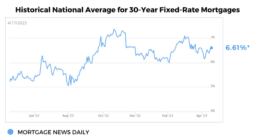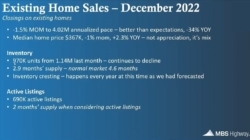
BETTING ON CANADA!
In the 2010 Olympics, Canada played the U.S. for the gold medal in hockey – and I upset a hockey fan and friend by betting on Canada.
My bet on Canada was really a bet on “efficient markets” because Canada’s team had a larger aggregate payroll in the NHL.
So, efficient markets theory told me that Canada was better because their players were paid more – and sure enough Canada won 😊
And yes, I know there is more to sports than payroll (or the Dodgers would have won the World Series), and yes I know markets are not always efficient – particularly when governments, monopolies or insider traders are involved.
But, more often than not, markets are amazingly efficient.
ZILLOW CALLS IT QUITS
There were headlines everywhere yesterday announcing Zillow’s exit from iBuying.
I discussed Zillow’s pause in iBuying in this blog last week, pointing out that they could not find supplies and contractors, and that they could not effectively compete with all of the huge firms and investors that are also looking for homes to buy.
EFFICIENT MARKETS
But, yesterday’s call to quit iBuying altogether was really just a reminder that the markets are much more efficient than many of us like to think.
And – that is why Zillow’s decision makes everything right with the world, as it allows for at least some predictability and normality in these crazy times.
HOUSE FLIPPING REQUIRES PEOPLE – NOT TECH
The most naïve thing about Zillow’s iBuying strategy, at least to me as a former house-flipper, was their belief that they could use scale and tech as some sort of advantage.
But – as all “flippers” know, flipping requires tremendous knowhow, boots on the street and very strong relationships with great contractors.
And – this is the case in even the strongest of markets.
A bunch of techies with apps, no matter how good their data, simply will never be able to properly assess a home, know what improvements to make, and know how to get them done.
WHY SELL FOR LESS?
In addition, why would sellers sell for significantly less or below market, when there are so many other buyers looking for homes?
Simply offering to make selling “easier” is not compelling enough to get sellers to sell significantly under market. So, Zillow was not able to find “the good deals” it was looking for.
WHAT HAPPENS IF THE MARKET FLATTENS OR CORRECTS?
Also, if Zillow cannot make money when the market is appreciating at 30% per year, what happens when the market slows or even sees a downward correction?
A 10% correction in housing (something we’ve all seen many times), would stick Zillow (or other large iBuyers) with billions of unsalable inventory and astronomical losses.
HUGE COMPANIES THAT LOSE MONEY
iBuying at scale may seem like a good idea possibly because people fall for the “tech” monikers in their names and because investors seem amazingly willing to bet on companies that lose money.
Here is a great article illuminating some of the biggest and most famous “losers,” including Airbnb, Uber, Lyft, Casper, Snap and Zillow.
Investors are willing to embrace these firms because of their stories and because investors are awash in capital and desperate to place it somewhere.
The fact that Zillow is actually worried about losses may be another sign that “all is right with the world.”
CONCLUSION
Readers might “short” Opendoor. 😊
Also, here is a short article that Rob Chrisman shared today that explains why Zillow’s exit is good for consumers, agents and investors.
Jay Voorhees
Founder/Broker | JVM Lending
(855) 855-4491 | DRE# 1197176, NMLS# 310167
























